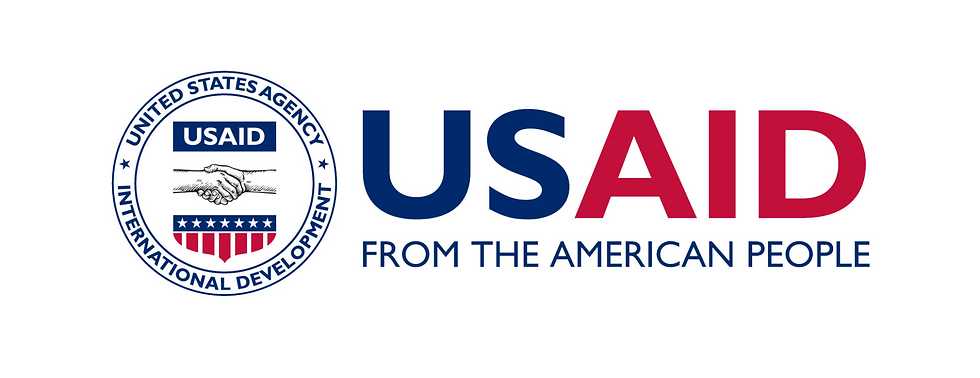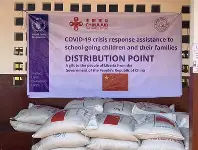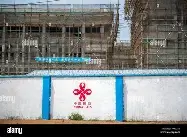How Dismantling USAID Impacts Liberia and Why We Must Embrace Soft Power Against China's Influence...or embrace them?
- chucklamark

- Jul 28, 2025
- 5 min read
Bye-Bye Miss American Pie! Drove my Chevy to the levee but the levee was dry... (Don McLean song American Pie)

The role of foreign aid in shaping nations is vital, especially for countries recovering from conflict or economic hardship. Liberia, with its rich history and troubled past, has greatly depended on USAID for its development. As discussions about cutting these aid programs gain momentum, it is crucial to assess how this shift could harm Liberia and its people. Additionally, with China's expanding influence in the region, the necessity for US soft power has never been more critical. The grip of the two hands is broken!
Liberia was founded in 1829 by the Liberian Society of Ameria. This was an organization that was made up of many famous people such as Francis Scott Keys. They believe the Black problem could be solved by sending the blacks back to Africa from whence they came. Ex-slaves and freed slaves were "repatriated" back to an area of West Africa that was already occupied by the indigenous people already there. Hence, the seeds of war and conflict were already planted due to ignorance and misguided goodwill.
The current population of Liberia is 5.7 million with a median age of 18.8 years. Life expectancy is about 62.5 years with an infant mortality rate of 54.3/ thousand. The average income is about $150/day. Maternal mortality ratio is 628/100,000 live births which is down from 1,749/100,000 in 2000. Yet, this is still one of the highest in the world today. Causes are hemorrhage, sepsis, obstructed labor, and hypertensive disorders. Contributing factors are limited access to skilled birth attendants, poor infrastructure and delays in emergency care.
Understanding the Role of US AID in Liberia
For decades, US AID has been a cornerstone of support for Liberia, enhancing healthcare, education, and infrastructure. The United States' commitment has provided essential backing for rebuilding efforts following the brutal civil wars that ravaged the country. For instance, USAID helped to establish over 150 health clinics across Liberia, dramatically improving local access to medical care and reducing maternal mortality rates by more than 50% from 2000 to 2017.
Without continued assistance, many of Liberia's critical development projects risk stagnating or failing entirely. Vital services, such as maternal and child health programs, could decline, leading to dire consequences for the population. Reports suggest that without sufficient funding, as many as 300,000 children could lose access to basic education.
Historically, Liberia's ties with the United States, often seen as a "big brother," foster a deep emotional and cultural bond. A withdrawal of USAID could disillusion citizens, eroding their trust in governance and foreign relations, which can lead to further instability.
The Ripple Effects of Dismantling USAID
Eliminating USAID will have far-reaching consequences across various sectors in Liberia. The healthcare sector stands out as one of the most affected. Since the Ebola outbreak, Liberia's public health system has relied heavily on US funding. USAID has equipped the nation with crucial resources, such as training for over 5,000 healthcare workers and supplying tens of thousands of needed medical kits. Without this support, Liberia could face another health crisis, elevating morbidity and mortality rates significantly.
In education, USAID funding has helped numerous schools improve facilities and train teachers. Over the past two years, more than 70,000 students benefited from scholarships supported by US initiatives. A decrease in this aid could exacerbate the already fragile education system, diminishing opportunities for the next generation and leaving the workforce unprepared for the modern economy.
Additionally, USAID-funded infrastructure projects have been vital for developing roads, increasing electricity access, and improving water supply systems. For example, investments have facilitated building over 200 miles of new roads, which are crucial for trade and transportation. Without ongoing support, Liberia risks regressing into cycles of dependency and underdevelopment, undoing years of hard-won progress.
The Growing Threat of China's Influence
While the US has historically supported Liberia, China's increasing presence in Africa presents a significant challenge. Chinese investments are rising, often arriving with fewer strings attached than US assistance. Many nations view the promise of rapid infrastructure improvements as an attractive offer, but such projects often prioritize resource extraction over sustainable development. For example, a recent infrastructure project in Liberia funded by China led to the depletion of local resources, raising concerns about long-term sustainability.
This shift may foster a new dependency on foreign investment, undermining Liberia’s economic independence and sovereignty. Moreover, China’s promotion of alternative values can cloud the democratic ideals the US represents, such as human rights and good governance. The potential decrease of USAID programs could be interpreted as a retreat from these principles, creating opportunities for China to solidify its influence in Liberia.
The Importance of US Soft Power
Amidst these challenges, US soft power is essential. Unlike hard power, which includes military might or economic sanctions, soft power prioritizes cultural exchange, diplomatic engagement, and partnership building. It promotes ideals based on mutual trust and understanding, fostering collaboration on shared goals.
To counter China's growing influence, the US must strengthen its commitment to Liberia through soft power initiatives. This could include more diplomatic interactions, educational and cultural exchanges, and investments in local entrepreneurship.
Empowering Liberians through education and support for local businesses will cultivate future leaders and reduce the influence of foreign powers that may not prioritize citizens' welfare. A focus on capacity-building and innovation can create sustainable growth and long-term stability for Liberia.
A Vital Commitment for the Future
The dismantling of USAID in Liberia poses serious risks to the country's development and the well-being of its people. The repercussions will ripple through healthcare, education, and infrastructure, potentially reversing progress made over the years. As China's presence expands in Africa, a strong and engaged American role remains crucial—not through hard power, but by emphasizing soft power strategies.
Investing in Liberia transcends fiscal accountability; it’s about nurturing the potential of a nation and upholding the values that foster democracy and sustainable growth. The future of Liberia and the broader global community hinges on a robust and compassionate commitment to empowering its citizens, ensuring a brighter path forward. By standing beside Liberia, we reaffirm not only our alliance but a shared vision for collective progress and prosperity.
However
Here is a thought: When one looks at China and how it has literally lifted hundreds of million people out of poverty within the last 50 years to the point that it is one of the most, if not the most modern country on the planet. Perhaps, just perhaps could they do the same for Africa? For Liberia? The average income in China today is $1,385 USD vs $150 USD in Liberia. The average income in China in 1980 was $280 USD urban and $112 USD rural. Middle class ranges from $14,000 to $70,000 per year. Liberia's middle class tops out at $6.000 per year currently. In 1980 the average monthly income was $43 USD. Who has done a better job and under who's watchful eye? You decide!
































Comments